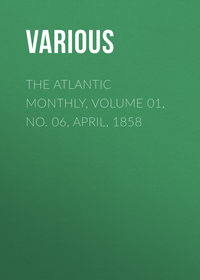Kitabı oku: «The Atlantic Monthly, Volume 01, No. 06, April, 1858», sayfa 14
Various
Bir şeyler ters gitti, lütfen daha sonra tekrar deneyin
Türler ve etiketler
Yaş sınırı:
0+Litres'teki yayın tarihi:
30 kasım 2018Hacim:
300 s. 1 illüstrasyonTelif hakkı:
Public Domain